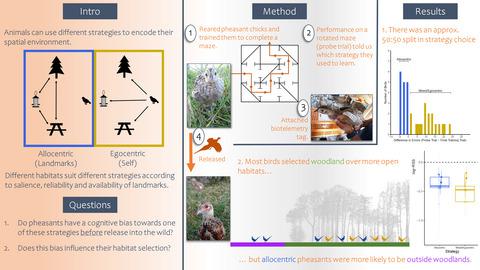当前位置:
X-MOL 学术
›
Ecol. Lett.
›
论文详情
Our official English website, www.x-mol.net, welcomes your
feedback! (Note: you will need to create a separate account there.)
Is habitat selection in the wild shaped by individual‐level cognitive biases in orientation strategy?
Ecology Letters ( IF 7.6 ) Pub Date : 2021-02-22 , DOI: 10.1111/ele.13694 Christine E. Beardsworth 1 , Mark A. Whiteside 1 , Philippa R. Laker 1 , Ran Nathan 2 , Yotam Orchan 2 , Sivan Toledo 3 , Jayden O. Horik 1 , Joah R. Madden 1
Ecology Letters ( IF 7.6 ) Pub Date : 2021-02-22 , DOI: 10.1111/ele.13694 Christine E. Beardsworth 1 , Mark A. Whiteside 1 , Philippa R. Laker 1 , Ran Nathan 2 , Yotam Orchan 2 , Sivan Toledo 3 , Jayden O. Horik 1 , Joah R. Madden 1
Affiliation

|
Cognitive biases for encoding spatial information (orientation strategies) in relation to self (egocentric) or landmarks (allocentric) differ between species or populations according to the habitats they occupy. Whether biases in orientation strategy determine early habitat selection or if individuals adapt their biases following experience is unknown. We determined orientation strategies of pheasants, Phasianus colchicus, using a dual‐strategy maze with an allocentric probe trial, before releasing them (n = 20) into a novel landscape, where we monitored their movement and habitat selection. In general, pheasants selected for woodland over non‐woodland habitat, but allocentric‐biased individuals exhibited weaker avoidance of non‐woodland habitat, where we expected allocentric navigation to be more effective. Sex did not influence selection but was associated with speed and directional persistence in non‐woodland habitat. Our results suggest that an individual's habitat selection is associated with inherent cognitive bias in early life, but it is not yet clear what advantages this may offer.
中文翻译:

野生动植物的栖息地选择是否受到定向策略中个体水平的认知偏差的影响?
物种或种群之间根据自身所居住的栖息地而对与自身(以自我为中心)或地标(以allocentric)相关的空间信息(定向策略)进行编码的认知偏差有所不同。定向策略的偏向是否决定了早期栖息地的选择,还是个人是否会根据经验来适应偏见。我们确定的野鸡,定向策略雉鸡,采用了双策略迷宫与非自我中心探测试验,释放他们之前(ñ = 20)进入一个新颖的景观,我们在其中监测了它们的运动和栖息地的选择。一般而言,在非林地栖息地中选择林地的野鸡,但是有偏心偏见的个体对非林地栖息地的回避能力较弱,因此我们期望同心圆导航更为有效。性别不影响选择,但与非林地栖息地的速度和方向性持久性有关。我们的结果表明,一个人的栖息地选择与早期生活中固有的认知偏见有关,但尚不清楚这可能带来什么好处。
更新日期:2021-03-16
中文翻译:

野生动植物的栖息地选择是否受到定向策略中个体水平的认知偏差的影响?
物种或种群之间根据自身所居住的栖息地而对与自身(以自我为中心)或地标(以allocentric)相关的空间信息(定向策略)进行编码的认知偏差有所不同。定向策略的偏向是否决定了早期栖息地的选择,还是个人是否会根据经验来适应偏见。我们确定的野鸡,定向策略雉鸡,采用了双策略迷宫与非自我中心探测试验,释放他们之前(ñ = 20)进入一个新颖的景观,我们在其中监测了它们的运动和栖息地的选择。一般而言,在非林地栖息地中选择林地的野鸡,但是有偏心偏见的个体对非林地栖息地的回避能力较弱,因此我们期望同心圆导航更为有效。性别不影响选择,但与非林地栖息地的速度和方向性持久性有关。我们的结果表明,一个人的栖息地选择与早期生活中固有的认知偏见有关,但尚不清楚这可能带来什么好处。











































 京公网安备 11010802027423号
京公网安备 11010802027423号